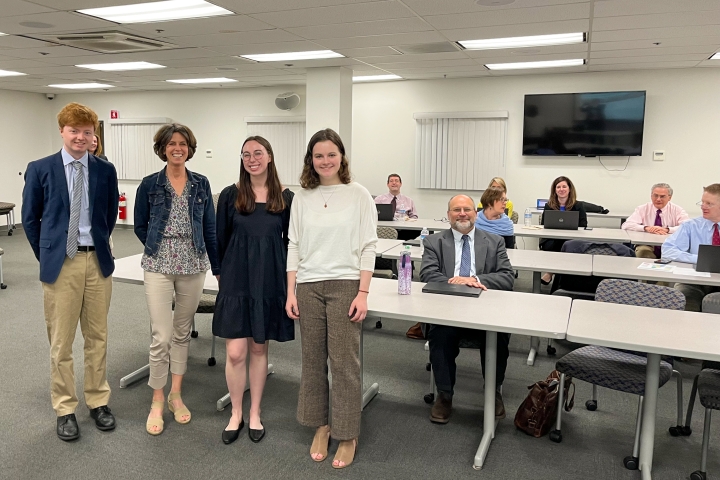Three researchers from the Class of 1964 Policy Research Shop briefed a meeting of New Hampshire Superior Court judges this month on the effectiveness of criminal mediation across the state’s judicial system.
The analysis, commissioned by Chief Justice of the Superior Court Tina Nadeau, involved 20 interviews with county court clerks, judges, prosecutors, public defenders, and other parties in nine of New Hampshire’s 10 counties (logistics prevented an interview in Merrimack County within the time frame).
And while there were some impediments to acceptance of the restorative justice alternative to criminal trials, such as a limited number of mediating judges, or a reluctance among some prosecutors to embrace the process when key facts remained in dispute, overall mediation is viewed positively by those interviewed, Dara Casey ’25, Jack Keating ’23, and Zoe McGuirk ’25 told the gathering of judges.
“New Hampshire is the pioneer of an innovative method of criminal justice and could become a national model. Its early successes and potential for even greater success illuminate an exciting path forward,” McGuirk told Nadeau and more than a dozen other judges at the meeting in Concord on April 14.
Among the report’s recommendations, based on interviews with court system participants, was standardization of memoranda outlining the facts from the attorneys to mediating judges in advance of mediation sessions; a more rigorous data collection process to record outcomes of mediation; and increasing the number of mediating justices.
“It is just an incredible opportunity to get to do this work at the direction of Justice Nadeau, one of the top practitioners of alternative dispute resolution,” Casey said after the presentation.
Nadeau is a leader in the development of drug courts in New Hampshire, which combine community-based treatment programs with strict court supervision and progressive incentives and sanctions. She is also a national advocate for the legal alternative that incorporates addiction and mental health treatment.
During the pandemic, Nadeau took on the New Hampshire courts’ effort to make mediation, normally used only in civil cases, available in criminal cases on a pilot basis.
“We’ve been doing felony settlement conferences for quite a while, which is a restorative justice way of resolving cases. Then during the pandemic we decided to try a less formal process, criminal mediation, that can be for any case,” Nadeau says.
At that time, Nadeau was the 2021 Perkins Bass Distinguished Visitor at the Nelson A. Rockefeller Center for Public Policy and the Social Sciences, where she gave lectures in classes and delivered a public lecture on the development of the drug courts in New Hampshire. She met Ronald Shaiko, director of the Policy Research Shop and associate director of curricular and research programs at the center.
“In conversation with Ron, I thought I’d love to have someone come in and actually evaluate, what do the lawyers think about it, what do the judges think about it,” Nadeau says. “I just thought this would be the perfect thing for students to evaluate. It is a new process, there are many different perspectives, it is ideal for conducting qualitative interviews with key actors in each New Hampshire county, and that kind of evaluation of the opinions of the people involved in the work is an important lesson in leadership.”
The chief justice was impressed with the students’ efforts.
“They did a magnificent job. The document itself is so professional. The way they went about gathering information was very analytical and objective. Their recommendations are spot on, and they are unafraid of telling us what we need to hear, which is what I appreciate from their work,” Nadeau says.
Shaiko, who is retiring at the end of this term and turning over the direction of the Policy Research Shop to Visiting Associate Professor of Sociology Kristin Smith, says the students conducted themselves professionally and respectfully before the Superior Court judges.
“These are important, real-life leadership lessons that they will carry with them into their careers,” he says.
In the 19 years since the program was created, some 600 students have produced more than 250 policy briefs for public, administrative, and legislative entities in Vermont and New Hampshire on a pro bono basis.
“At a very conservative consulting rate of $50 an hour, the students have provided more than $3.5 million in policy analysis for New Hampshire and Vermont policymakers,” says Shaiko. “I could not be more proud of the work of my students on the Policy Research Shop.”
Smith says she looks forward to continuing the project.
“The Policy Research Shop provides a unique opportunity for Dartmouth undergraduate students to apply their research skills to real-life public policy questions confronting policymakers in New Hampshire and Vermont. I am thrilled to join PRS and continue this important work engaging with students on critical public policy research,” she says.
